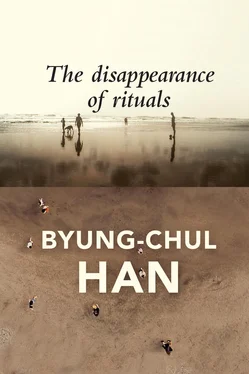Rituals are processes of embodiment and bodily performances. In them, the valid order and values of a community are physically experienced and solidified. They are written into the body, incorporated, that is, physically internalized. Thus, rituals create a bodily knowledge and memory, an embodied identity, a bodily connection. A ritual community is a communal body [Körperschaft], and there is a bodily dimension inherent to community. To the extent that it exerts a disembodying influence, digitalization weakens common ties. Digital communication is disembodied communication.
Ritual acts also include feelings, but the bearer of these feelings is not the isolated individual. In a ritual of mourning, for instance, the mourning is an objective feeling, a collective feeling. It is impersonal. Collective feelings have nothing to do with individual psychology. In a ritual of mourning, the community is the actual subject that mourns. Faced with the experience of loss, the community imposes the mourning upon itself. Such collective feelings consolidate a community. The increasing atomization of society also takes hold of its emotional world. The formation of collective feelings becomes less frequent. Instead, fleeting affects and emotions, the states of isolated individuals, predominate. Unlike emotions and affects, feelings can be collective. Digital communication, however, is predominantly affect based: it tends towards the immediate outpouring of affect. Twitter is an affective medium, and the politics based on it is an affective politics. Politics is reason and mediation; reason, which is time-intensive, is currently being replaced by immediate affect.
The neoliberal regime isolates people while at the same time invoking empathy. Because it is a resonant body, however, ritual community does not require empathy. The demand for empathy can be heard in particular in atomized societies. The present hype surrounding the concept has primarily economic causes: empathy is used as an efficient means of production; it serves the purpose of emotionally influencing and directing people. Under the neoliberal regime, a person is not only exploited during working hours; rather, the whole person is exploited. In this context, emotional management turns out to be more effective than rational management. The former reaches deeper into a person than does the latter. Neoliberal psycho-politics attempts to elicit positive emotions and to exploit them. In the final analysis, it is freedom itself that is here being exploited. In this respect, neoliberal psycho-politics differs from the biopolitics of industrial modernity, which operates through disciplinary compulsion and command.
Digital communication is increasingly developing into communication without community. The neoliberal regime encourages communication without community by isolating everyone as the producer of him- or herself . Producing is derived from the Latin verb producere , meaning presenting or making visible. Like the French produire it still carries the meaning of presenting. Se produire means ‘to play to the gallery’. The colloquial German expression sich produzieren probably has the same etymology. Today, we are constantly and compulsively playing to the gallery. This is especially the case, for instance, on social media: the social is coming to be completely subordinated to self-production. Everyone is producing him- or herself in order to garner more attention. The compulsion of self-production leads to a crisis of community. The so-called ‘community’ 13that is today invoked everywhere is an atrophied community, perhaps even a kind of commodified and consumerized community. It lacks the symbolic power to bind people together.
Communication without community can be accelerated because it is additive. Rituals, by contrast, are narrative processes that do not allow for acceleration. Symbols stand still . This is not the case with information: information exists by circulating. Stillness only means that communication ceases, stands still. It does not produce anything. In the post-industrial age, the noise of the machines gives way to the noise of communication. More information and more communication holds out the promise of more production. Thus, the compulsion of production expresses itself in the compulsion of communication.
The compulsion of production brings with it the compulsion to perform well. Performance differs from labour in libido-economical terms. In the case of labour, the ego need not take centre stage. In the case of performance, however, the ego relates specifically to itself. It not only produces an object; it produces itself . Someone who is absorbed by object-libido does not produce but rather exhausts him- or herself . The narcissistic relation to the self constitutes the performance. The ego-libido rules over the performing subject. The better it performs, the more ego it gains. Freud, we know, associated the ego-libido with the death drive. The narcissistic subject of performance breaks apart because of a fatal accumulation of ego-libido. It exploits itself voluntarily and passionately until it breaks down. It optimizes itself to death. Its failing is called depression or burnout.
In a society governed by ritual, there is no depression. In such a society, the soul is fully absorbed by ritual forms; it is even emptied out. Rituals contain aspects of the world, and they produce in us a strong relationship to the world. Depression, by contrast, is based on an excessive relation to self. Wholly incapable of leaving the self behind, of transcending ourselves and relating to the world, we withdraw into our shells. The world disappears. We circle around ourselves, tortured by feelings of emptiness. Rituals, by contrast, disburden the ego of the self, de-psychologizing and de-internalizing the ego.
Hierarchies and power relations are often inscribed in rituals. By means of their aesthetic aspects, rituals can also lend a certain aura to domination. But they are in essence symbolic practices of ‘making at home in the world’. Roland Barthes also conceives of rituals and ceremonies from the perspective of ‘making at home in the world’. They protect us, he says, against the abysses of being: ‘Ceremony … protects like a house: something that allows one to live in one’s feelings. Example: mourning… .’ The ceremony of mourning ‘acts like a varnish, protects, insulates the skin against the atrocious burns of mourning’. 14When there are no rituals to act as protective measures, life is wholly unprotected. The compulsion of production cannot cope with this transcendental lack of protection and lack of being at home, which it ultimately exacerbates. 15
1 1. Gadamer, ‘The Relevance of the Beautiful’, in The Relevance of the Beautiful and Other Essays, p. 47.
2 2. Saint-Exupéry, The Wisdom of the Sands, p. 16.
3 3. Arendt, The Human Condition, p. 137.
4 4. Handke, Phantasien der Wiederholung, p. 8.
5 5. See ‘Tee trinkend die Welt verändern? Yes, we Kännchen’, at https://blog.naturkost.com/2016/11/charitea-bio-tee-fair-trade.
6 6. Douglas, Natural Symbols, p. 1.
7 7. Transl. note: See Türcke, Hyperaktiv! Kritik der Aufmerksamkeitsdefizitkultur.
8 8. Kierkegaard, Repetition and Philosophical Crumbs, p. 3.
9 9. Ibid.
10 10. Ibid., p. 4.
11 11. Handke, Phantasien der Wiederholung, p. 57.
12 12. Rosa, Resonances, p. 173.
13 13. Transl. note: ‘Community’ in English in the original.
14 14. Barthes, The Neutral, p. 124.
15 15. The need for ritual and fixed rules is being felt again following years of excessive deregulation. It is no coincidence that the subtitle of Jordan B. Peterson’s well-known self-help book, 12 Rules for Life, is An Antidote to Chaos. The demand for individually designed rites to mark the phases of life and their transitional points is also on the increase, with the place of priests now taken by so-called ritual designers. These novel rituals have to obey the imperative of authenticity and creativity. But they are not rituals in the proper sense. They do not exert the symbolic force which directs life towards something higher and thus provides meaning and orientation. Where there is no longer a higher order, rituals disappear.
Читать дальше












